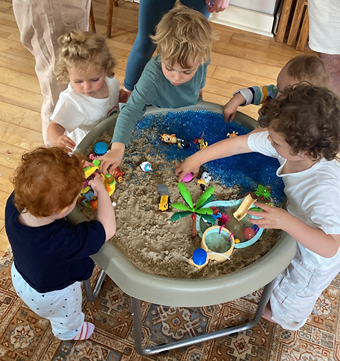EECERA Conference 2025 – Guest Blog # 42: Promoting a sensory pedagogy for all
Posted 25th August 2025
One of a series of short blog posts by presenters who will be sharing their work at the upcoming annual conference in Bratislava, Slovakia. Any views expressed in this post are those of the author(s) and do not necessarily reflect the official stance of their affiliated institution or EECERA.
Promoting a sensory pedagogy for all
By Gillian Beck (Stranmillis University College)

The environment and how pupils’ physical interaction within it shapes their academic, social and emotional development has been central to much literature and research in Early Years Education (age 0-8). At this age and stage, the focus is on ensuring opportunities for pupils’ meaningful engagement with the environment as an additional educator. It is, therefore, unsurprising that in Early Years research, the vocabulary of embodied cognition has begun to emerge. This discourse shifts our understanding of sensory processing beyond a factor in Autism diagnosis or other SEN (APA, 2013). Instead, it moves sensory processing to the centre of our thinking about cognition and learning, recognising the role of the whole body in shaping our perceptions and, consequently, our self-knowledge, self-esteem and self-efficacy (Barrett, 2011). However, if the human body is the centre of all our experiences, “seeing and unseen, hearing and heard” (Johansson and Løkken, 2014, p.889), teachers should be equipped to understand and encounter children through their embodied mind and senses. Learners should be encouraged to be more self- and other-aware so that they can either make or request their own environmental changes and make positive choices in support of the classroom community. This goes beyond careful design and adjustment of the learning environment and provision of multi-sensory learning resources and activities: even beyond the teaching of sensory self-regulation skills to children. Occupation therapy research recognises the important role of sensory informed teachers/carers in supporting pupils’ sensory awareness and modulation (Miller-Kuhaneck and Watling, 2018), however availability of occupational therapy advice for schools was found to be inconsistent and often available to individual pupils while best efforts from uniformed teaching professionals often resulted in inappropriate interventions and lack of teachers’ professional confidence (Beck et al., 2021). A gap in the research and provision identified a need for sensory-informed teacher education programmes to ensure recognition of sensory factors impacting individual and group learning (Wang and Zheng, 2018) and personal development– both positive and detrimental- and make daily adjustments at the point of need.
At the 33rd Annual EECERA Conference in Bratislava, I will present my PhD research, which tracked the learning journey of a sensory teacher education programme on teachers’ planning and the development of a sensory pedagogy. This was not engaged with as a passive process of content acquisition but negotiated in line with teachers’ professional judgement and observations. The outcome allowed for ‘social, creative and active … involvement in learning’ (Guerriero, 2017, p.79) for all members of the community of practice (Wenger et al., 2011;2002; 1998), including the researcher. This journey resulted in the upskilling of classroom assistants, raising of pupils’ sensory self-awareness and the developing use of a shared sensory vocabulary as part of every day, classroom interactions. Identifying and working with pupil identities resulted in equitable, pupil-centred support, that recognised the impact of sensory processing differences on the cognition and learning of all children, therefore the need for whole class support, and demonstrated the feasibility and potential of such an approach. For participant teachers, the collaborative design of the study created teacher professional development that contextualised continuous iterative improvement beyond the life of the research.
References
American Psychiatric Association (2013) Diagnostic Statistics Manual (5th Edition), USA, APA.
Beck, G, O’Connor-Bones, U., Gracie, J., Kelly, G. and Walsh, G. (2021), In Need of Review: Developing Sensory Provision in Northern Ireland’s Mainstream Primary Classrooms, Journal of Research in Special Educational Needs, 21 (3), 268–279, DOI: 10.1111/1471-3802.12519
Johansson, E. and Løkken, G. (2014) Sensory pedagogy: Understanding and encountering children through the senses, Educational Philosophy and Theory, 46(8), 886-897.
Miller-Kuhaneck, H. and Watling, R. (2018) Parental or Teacher Education and Coaching to Support Function and Participation of Children and Youth With Sensory Processing and Sensory Integration Challenges: A Systematic Review, American Journal of Occupational Therapy, 72 (1), https://doi.org/10.5014/ajot.2018.029017
Wenger, E. (1998) Communities of Practice: Learning, meaning and identity, Cambridge: Cambridge University Press
Wenger, E., Mc Dermot, R. and W.M. Snyder, (2002) Cultivating Communities of Practice: a guide to managing knowledge, Boston, MA: Howard Business School Press.
Wenger, E., Trayner, B. and de Laat, M. (2011) Promoting and Assessing Value Creation in Communities and networks: a Conceptual Framework, Heerlen: Open Universiteit, Ruud de Moor Centrum
Contact details:
Dr Gillian Beck, Stranmillis University College, Belfast
Email: g.beck@stran.ac.uk
Dr Gillian Beck will present work referred to in this blog in Symposium Set C19 | Wednesday 27th August 2025 (Schedule liable to change; please refer to final programme for details).
